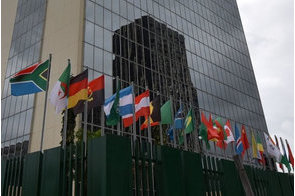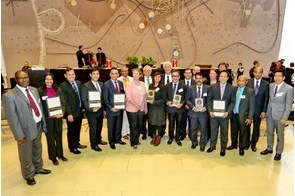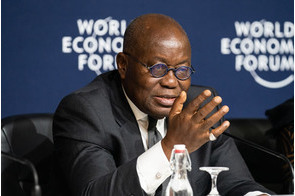AfDB’s new 5-year strategy for Nigeria to tackle Covid-19 economic shocks

Summary
The 2020-2024 CSP has two key priority areas for Nigeria, namely infrastructure development and social inclusion through agribusiness and skills development.
The African Development Bank (AfDB) has approved its Country Strategy Paper (CSP) 2020-2024 for Nigeria, following the expiration of the previous rolling plan for the period of 2013-2019. In a statement released today, the bank said the new five-year plan will build on the successes and challenges of the previous plan, whilst identifying opportunities that will shape Nigeria’s political and economic landscape, including in the post-COVID-19 period.
The bank also re-affirmed its support for Nigeria’s socio-economic advancement.
“In the implementation of the CSP, the Bank will also support Nigeria to address economic shocks associated with the COVID-19 pandemic and oil price shocks by focusing our interventions in sectors that will strengthen public health infrastructure and accelerate efforts towards economic transformation and diversification of export earnings and fiscal revenues from oil,” said Ebrima Faal, Senior Director for the AfDB.
The 2020-2024 CSP has two key priority areas for Nigeria, namely infrastructure development and social inclusion through agribusiness and skills development. These priority areas have been selected to leverage Nigeria’s rich endowment of natural and human resources. According to the bank, the new plan has been customized to support government efforts in confronting challenges and to foster long-term, socially-inclusive development.
The new CSP was announced amid an approval on Thursday by the Bureau of Board of Governors of the AfDB for an independent investigation of the allegations against the bank's President, Akinwumi Adesina, who is currently vying to be re-elected for a second term. At a meeting of the Bureau yesterday, a decision was taken to further investigate the whistle-blowers’ complaints against Adesina as demanded by the United States, a non-regional member country.
The demand for an independent investigation came after a May 5 report by the Ethics Committee of the bank cleared Adesina of wrongdoing. The AfDB President has repeatedly denied wrongdoing. During a visit to President Muhammadu Buhari on Tuesday, Adesina said the calls for a fresh investigation by the U.S. were against the rules of the bank.
Under the CSP, AfDB will deploy a combination of sovereign and non-sovereign financing instruments to support the two priority areas, including investment and institutional support projects, evidence-based analytical work in numerous economic sectors, policy dialogue and provision of advisory services. Special focus will be put on supporting the Nigerian private sector, in terms of financing and advisory services, and on Public-Private-Partnership (PPP) initiatives that enable innovative, long-term investment in energy, transport and water and sanitation.
AfDB, which was created in August 1963 and commenced operations in July 1966, said the CSP is fully aligned with its Ten-Year Strategy, the High 5 priorities and Nigeria’s own Economic Reform and Growth Plan (ERGP), as well as the global Sustainable Development Goals (SDGs).
Nigeria is the AfDB’s largest shareholder with active portfolio of about $5 billion as of December 2019. During the same period, the AfDB’s active portfolio in Nigeria comprised 61 operations. 29 of those operations were in the public sector, amounting to $2 billion (43% of Nigeria’s total portfolio) and 32 were non-sovereign operations with a total commitment of $3 billion (57% of the total portfolio).
Related
-
AfDB to support economic diversification in Djibouti
The new Country Strategy Paper for Djibouti focuses on developing infrastructure in the energy and health sectors and ...
-
Making sustainable finance sustainable
Banks should concern themselves with what is equitable to society and the environment while trying to make profit.
-
EIB pledges €170 million for starting National Development Bank of Ghana
The EIB last year provided EUR 5 billion for public and private investment across Africa.










